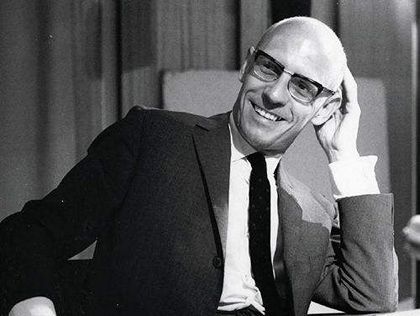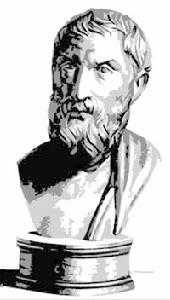
Michel Foucault is a French philosopher and, he is considered a postmodernist and a poststructuralist, Although he himself does not seem to agree with this very much. Michel Foucault was born on October 15, 1926, in a rural family in Poitiers, France. His father Paul was a physician. His original name was Paul-Michel Foucault, and later he gave up Paul in his name, which may have something to do with the rather tense relationship between him and his father.
Foucault directly mentioned the concept related to death in his book “Words and Things”, that is, “death of men”. The content of the book does sound a bit obscure now, but I believe you will understand it after reading this article. The main point of the book “Words and Things” is that each historical stage has a set of rules for the formation of knowledge that are different from those of the previous period (Foucault called it the epistemological (épistémè)), while the modern knowledge is characterized by ” human” is the center of research.
Foucault mentioned in an interview in 1966: “I believe that the human has been if not a bad dream, a specter, at least a very particular figure”. Here, although he did not strictly divide humans, he believes that people are obviously special. He then said: “Humans are very historically determined and situated in our culture.” Through words such as “determined” and “culture”, we can first clarify that the “human” in Foucault’s “death of man” is the non-biological sense, but as work as a concept, and this conceptual human is shaped by culture and history. After clarifying the basic concepts, the following will first give a general description of the concept of the “death of man”. After you have a general understanding of this concept, I will expand to introduce the internal logic of the each element.
Foucault believed that In the 19th century and also the first half of the 20th century, it was believed that the human was the fundamental reality of our interest. the impression that the search for the truth about the man had animated all research, possibly including science, Morality, philosophy, etc. Foucault believed that until the end of the 18th century, before the French Revolution, “we never with the human as such.”
You may ask, since the birth of human civilization, haven’t we been developing around ourselves, include the concept of “humanity”? The meaning behind this question is that we believe that the concept of “human” was originally present. In fact, Foucault believes that the notion of a human actually began to appear in modern times. He believes that it was not until the end of the 18th century that we really began to talk about humans. Moreover, Foucault called the analysis of people in modern thought since the end of the eighteenth century as anthropology. This is his brief description of the relationship between human and humanism: “You can’t find the term human earlier because humanism is an invention of the late 19th century”. This sentence actually contains a lot of information. First of all, Foucault further defined the concept of humans. In addition to the aforementioned human as a product of history and culture, the concept of human also refers to a term in humanism that appeared in the 19th century. From this, we can be sure that the human Foucault is talking about is a human in a discipline, a person of a concept, or a person that is based on the concept that is formed in the humanities.
Foucault believes that Before the 19th century, it can be said the human did not exist. What exists were a number of problems, a certain number of forms of knowledge and thought, where it was a question of nature, or a question of truth, or a question of the movement, a question of order, or a question of a presentation, etc. But there was not a question of human. The human is a figure constituted near the end of the 18th century and the beginning of the 19th century, which gave rise to what has been and still are called the human sciences.
Foucault believed that paradoxically, the development of the human sciences is now leading to the disappearance of the human rather than an apotheosis of the human. After the 18th century, huamn gradually became the center of the humanities and the concept of humanism throughout the 19th century. However, Foucault announced that this anthropology was going to die. This is the so-called “death of man”, or in other words, the end of huamn or the disappearance of man. As mentioned above, the “death of man” here is the death of a human being as a form of knowledge and ideology, and the death of a human-centered discipline. In the end, it is the death of modern human-centered knowledge since the end of the eighteenth century. So far, we have clarified what Foucault means by “death of men”, but why does he say that? How did such a “person” in the conceptual sense die and disappear? What is the essential difference between the existence and non-existence of the concept of man? What does the concept of “knowledge” mentioned repeatedly above specifically refer to?
To truly understand why Foucault said that “people did not appear until the end of the 17th century”, we first need to understand a very important concept he put forward in the book “The Order of Things”—representation. I will tell this concept through one of the world’s famous paintings, “The Maids of Honor”.

Collection: Prado Art Museum, Spain
Creation time: 1656
Author: Velázquez
The painter in the left hand of this painting is the painter himself, namely Velázquez. He was painting for the king and the queen. Unfortunately, the little princess Margaret broke in. The entourage was a little panicked and made a gesture of coaxing the little princess, saluting and handing water. The king and queen are not in the center of the picture, they are only shown through a mirror. The main body of the picture seems to be the little princess and his attendants, but a closer look at their eyes reveals that they are actually looking forward. Including the people in the hallway behind are actually looking forward. Combining the spatial relationship with the king and queen in the mirror, it is not difficult to find that the little princess and the attendants are looking at the king and queen. This is the most interesting part of this painting. The majesty of the king and queen is obviously the main content of this painting, but the painting “The Maids of Honor” does not put them in the center of the painting. But through the eyes of other people, the king and queen expressed by the contrast of the direction and the reflection of the rear mirror. The entire painting can be regarded as a representation. In this representation, that is, in this painting, the subject is the king and queen, but they cannot represent themselves, they can only be reflected in a mirror. This painting shows the characteristics of “representation”: the subject of the presentation is concealed, and the subject and the object of the presentation can represent each other, but the subject cannot represent itself, but can only be represented as an object.
The different relations formed by the subject and the object of the representation lead to the difference of the knowledge type (épistémè). According to the book The Order of Things, the knowledge type is the “basic code of culture.” These codes may include language, perceptual framework, communication, skills, value, etc. It is these so-called “basic codes” that construct different cultures, and different cultures lead to different concepts of “human”. The difference in the concept of “person” will further lead to the different relationships formed by the subject and the object of the appearance.
The culture here does not refer to race or regional culture, but the entire Western culture. Foucault divided culture into four periods, namely Renaissance, Classical, Modern, and Contemporary. The concept of “death of man” mainly refers to the classical and modern periods, so this article will not dwell on other periods too much.
Foucault believes that in the classical period, around 1660-1800, the characteristic of knowledge is the most basic appearance, as in the above “The Maids of Honor”: the subject and the object are opposed, and the subject cannot represent itself and needs express through objects. As mentioned in the previous article, the philosophical propositions of the classical period may include what is nature and what suits the social rules of man. These issues or subjects are highly related to people, but they are not directly discussing people as the subject, but are representing people (subjects) through another proposition, namely, the object.
Until the philosopher René Descartes put forward “I think, therefore I am”. The core of the sentence “I think, therefore I am” is that Descartes believes that he can doubt anything in the world, but the only thing he can be sure of is the existence of “I think” because when he doubts other things, he cannot doubt his own thinking at the same time. “Foucault believes that Descartes’s words mark the arrival of the modern era because Foucault believes that the symbol of modern thought is that people can represent themselves. In the classical period, the concept of people needs to be represented by objects. But now it’s not needed anymore. Man is both an object and a subject. Returning to Descartes’ example, in “I think, therefore I am”, the existence of “I” does not need to be proved or represented by other things. On the contrary, “I “Existence is due to “I” thinking. This idea that “humans can represent human through themselves” is also called self-representation by Foucault.
However, this modern period also quickly entered the contemporary period. Foucault believes that its symbol is “God is dead” put forward by Nietzsche. Nietzsche believed that God and man belonged to each other: On the one hand, man was overlooked and even created by God, and at the same time, God is also the God of man. There is no full existence of man, and God also has no meaning of his own existence. The appearance of God is the result of the appearance of a man. The meaning of the two depends only on the other, and can only be interpreted under the conditions of using the other as a reference, as a context, and as an explanation. They cannot be isolated and isolated from each other. In this case, God and man are both the subject and the object of each other. In this way, God and human need are inseparable, and the two serve as references to each other. In this relationship, if one party dies, the other party will die, and if one party loses all its existence, the other party will also die. It is in this relationship that Foucault wrote: “the death of God involved the death of the subject as well…. for the death of man is but part of the tragedy of the death of God.”
“Foucault thought that “the death of God” is a start or basis of the “death of man”. He believes that psychoanalysis, linguistics, and other disciplines developed in the contemporary era are all the dissolution and deconstruction of people. The relationship between people and their language, psychology, cognition, and other things is also interdependent. They are both each other’s object and each other’s subject. The original object can better support the existence of human beings, but from “God is dead” to later linguistics, structuralism, psychoanalysis, etc., all objects dispel the subject. Faced with this, the existence of human beings in disciplines and knowledge will be closer to death.
As in the last sentence of the last page of “Words and Things”, Foucault wrote: “Man will be erased, like a face on the sand by the sea.”
Work Cited
Foucault, Michel. The Order of Things: an Archaeology of the Human Sciences. Routledge, 2010.
Nietzsche, Friedrich Wilhelm, et al. The Gay Science. Dover Publications, Inc., 2020.
“Cogito, Ergo Sum.” Wikipedia, Wikimedia Foundation, 6 May 2021, en.wikipedia.org/wiki/Cogito,_ergo_sum.
“Las Meninas – The Collection.” The Collection – Museo Nacional Del Prado, www.museodelprado.es/en/the-collection/art-work/las-meninas/9fdc7800-9ade-48b0-ab8b-edee94ea877f.

